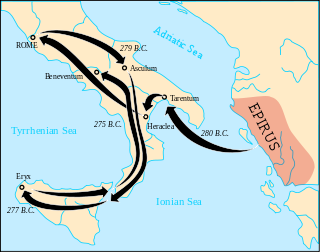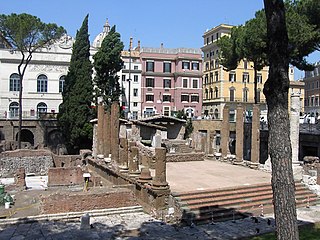Related Research Articles

This article concerns the period 59 BC – 50 BC.

The First, Second, and Third Samnite Wars were fought between the Roman Republic and the Samnites, who lived on a stretch of the Apennine Mountains south of Rome and north of the Lucanians.

The gens Valeria was a patrician family at ancient Rome, prominent from the very beginning of the Republic to the latest period of the Empire. Publius Valerius Poplicola was one of the consuls in 509 BC, the year that saw the overthrow of the Tarquins, and the members of his family were among the most celebrated statesmen and generals at the beginning of the Republic. Over the next ten centuries, few gentes produced as many distinguished men, and at every period the name of Valerius was constantly to be found in the lists of annual magistrates, and held in the highest honour. Several of the emperors claimed descent from the Valerii, whose name they bore as part of their official nomenclature.

The Battle of Heraclea took place in 280 BC between the Romans under the command of consul Publius Valerius Laevinus, and the combined forces of Greeks from Epirus, Tarentum, Thurii, Metapontum, and Heraclea under the command of Pyrrhus, king of Epirus. Although the battle was a victory for the Greeks and their casualties were lower than the Romans, they had lost many veteran soldiers that would be hard to replace on foreign soil.

Gaius Lutatius Catulus was a Roman statesman and naval commander in the First Punic War. He was born a member of the plebeian gens Lutatius. His cognomen "Catulus" means "puppy". There are no historical records of his life prior to consulship, but his career probably followed the standard cursus honorum, beginning with service in the cavalry and continuing with the positions of military tribune and quaestor.

Publius Valerius Poplicola or Publicola was one of four Roman aristocrats who led the overthrow of the monarchy, and became a Roman consul, the colleague of Lucius Junius Brutus in 509 BC, traditionally considered the first year of the Roman Republic.
Publius Decius Mus, of the plebeian gens Decia, was a Roman consul in the years 312 BC, 308 BC, 297 BC and 295 BC. He was a member of a family that was renowned for sacrificing themselves on the battlefield for Rome.
Tiberius Sempronius Ti.f. Gracchus, a Roman Republican consul in the year 238 BC, was the first man from his branch (stirps) of the family to become consul; several other plebeian Sempronii had already reached the consulship and even the censorship. He is best known as the father of the similarly named consul of 215 and 213 BC, and the great-grandfather of the Brothers Gracchi.

Factorum ac dictorum memorabilium libri IX by Valerius Maximus was written around AD 30 or 31. It is a collection of approximately a thousand short stories that Valerius wrote during the reign of Tiberius. The stories are a variety of anecdotes illustrating how the ancient Romans lived. While the majority of the stories are of Roman life, he does have some foreign stories at the end of some chapters. Most of these are of Greek life and most of those are about Greek philosophers or famous kings.

The gens Horatia was a patrician family at ancient Rome. In legend, the gens dates back to the time of Tullus Hostilius, the third King of Rome. One of its members, Marcus Horatius Pulvillus, was consul suffectus in 509 BC, the first year of the Republic, and again in 507. The most famous of the Horatii was his nephew, Publius Horatius Cocles, who held the Sublician bridge against the army of Lars Porsena circa 508 BC.

Publius Cornelius Scipio Africanus was a Roman general and statesman, most notable as one of the main architects of Rome's victory against Carthage in the Second Punic War. Often regarded as one of the best military commanders and strategists of all time, his greatest military achievement was the defeat of Hannibal at the Battle of Zama in 202 BC. This victory in Africa earned him the surname Africanus.
Lucius Furius Medullinus, of the patrician gens Furia, was a politician and general of the Roman Republic who was consul twice and Consular Tribune seven times.
The Roman–Sabine wars were a series of wars during the early expansion of ancient Rome in central Italy against their northern neighbours, the Sabines. It is commonly accepted that the events pre-dating the Roman Republic in 509 BC are semi-legendary in nature.
Manius Valerius Maximus was Roman dictator in 494 BC during the first secession of the plebs. His brothers were Publius Valerius Publicola and Marcus Valerius Volusus. They were said to be the sons of Volesus Valerius.
Quintus Valerius Falto was a Roman politician in the 3rd century BC. Quintus was elected consul in 239 BC alongside Gaius Mamilius Turrinus. He was the brother of his successor, the consul Publius Valerius Falto who served in 238 BC.
Publius Valerius Poplicola was consul of the Roman Republic in 475 BC and 460 BC, and interrex in 462 BC.
Lucius Valerius Potitus was a five time consular tribune, in 414, 406, 403, 401 and 398, and two times consul, in 393 and 392 BC, of the Roman Republic.
Gnaeus Cornelius Cossus was a consular tribune of the Roman Republic in 406, 404 and 401 BC.
Quintus Servilius Fidenas was a prominent early Roman politician who achieved the position of Consular tribune six times throughout a sixteen year period. Quintus Servilius was a member of the illustrious gens Servilia, a patrician family which had achieved great prominence since the foundation of the republic. In particular, Servilius was the son of Quintus Servilius Priscus Fidenas, a well respected statesman and general who served as dictator twice, in 435 and 418 BC, as well as holding the religious title of either augur or pontifex, which he held until his death in 390 BC. Servilius the younger himself had at least one son, also named Quintus Servilius Fidenas, who served as consular tribune in 382, 378, and 369 BC.
References
- ↑ Smith, William (1870). Dictionary of Greek and Roman biography and mythology. 2. Boston, Little. p. 135.